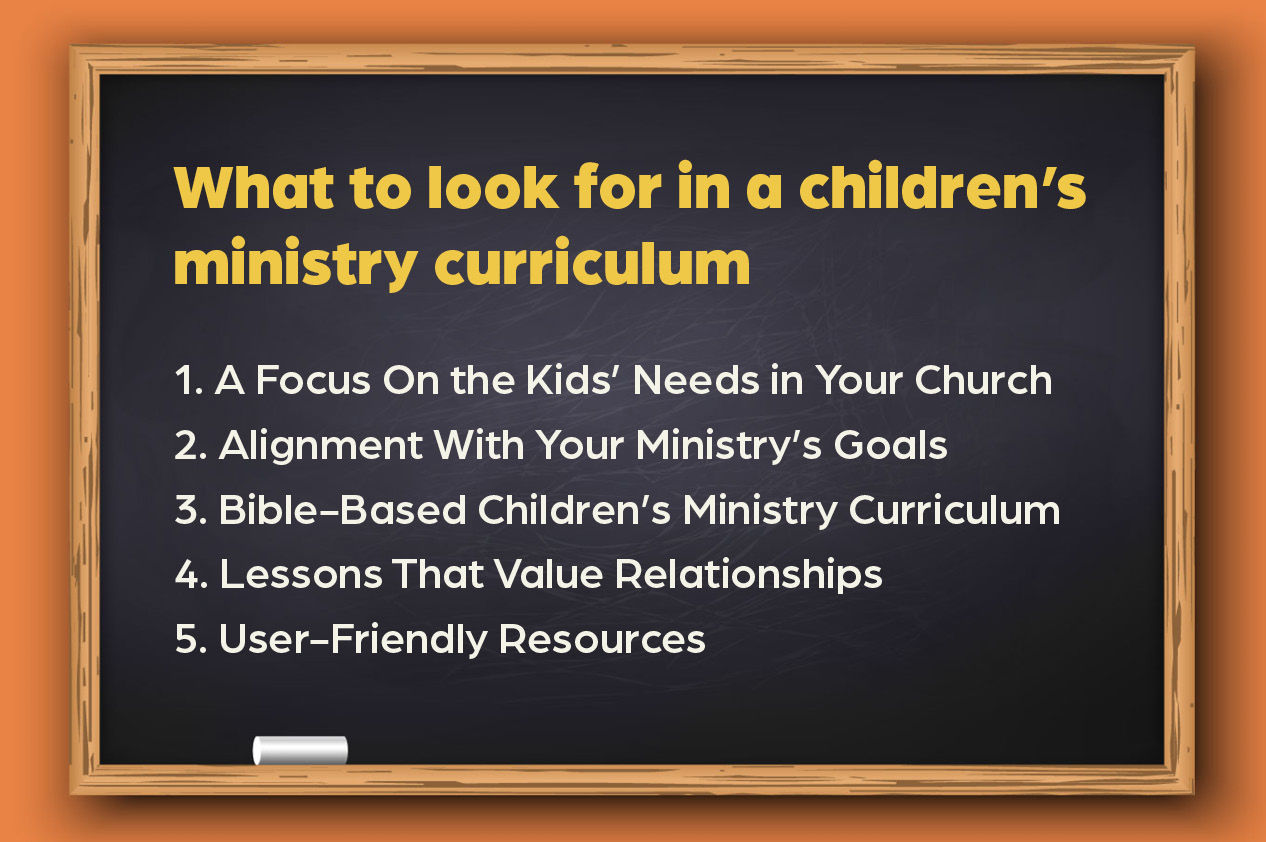Children’s Faith Curriculum: Building a Strong Foundation
When it comes to lesson planning for your children’s church group, your ultimate goal is likely to build a strong foundation upon which kids can grow and deepen their faith. While the right curriculum can guide them in a biblically sound direction, it’s up to you as a children’s ministry leader to lead them relationally.
In this guide, we’ll review three ways you can use children’s faith curriculum to build a strong foundation of faith for kids in your church. Let’s start at the very beginning: choosing the right curriculum.
1. Align your values.
When looking for a children’s faith curriculum, you’ll need to ensure the curriculum’s lessons meet the unique needs of your children’s program. The values you hope to instill should be reinforced by these lessons, meaning you’ll need to search for learning materials that align with those priorities.
Wonder Ink’s curriculum guide recommends looking for the following five elements in your search:

- A focus on kids’ needs: A flexible curriculum enables your children’s ministry leaders to cater to kids’ unique needs depending on their learning abilities, biblical knowledge, and other factors.
- Alignment with your ministry’s goals: Evaluate the goals of your children’s program and determine how your curriculum will help you achieve them.
- Biblical basis: Ensure that every resource offered by your curriculum has biblical lessons, references, and values. Your curriculum should ultimately point kids to God in the Bible and encourage them to read it for themselves.
- Emphasis on relationships: Choose a curriculum that first encourages kids to develop personal relationships with God. Also, lessons should encourage faith through relationships with their families and other believers.
- User-friendly resources: To give volunteers and other children’s ministry leaders access to the tools they need, ensure the curriculum you choose is user-friendly and integrates with any other church resources. For example, you might provide training on how to use the curriculum’s digital resources. Be sure to make your church’s website easy to navigate so volunteers can access training materials.
Your church’s core values are foundational to its beliefs and the way it fulfills its mission, and a deep faith foundation starts with kids’ curiosity about God. Once you’ve selected a children’s faith curriculum, preface the material by calling out its core values and explaining what you’ll learn as a group. Point out the underlying values of each lesson as you progress through the curriculum.
2. Collaborate with your church.
A foundational component of faith is fellowship with other believers, which is why your children’s ministry should never be siloed from other aspects of the church. While children’s faith curriculum offers age-appropriate lessons to help kids deepen their faith, collaboration opportunities encourage community and offer kids the support they need to learn and grow.
Be sure to draw parallels between your children’s curriculum and other church activities, such as:
- Sermons and Bible studies: In church, the Bible is taught across all age groups, from the youngest to the oldest. A biblically-based curriculum can help kids and adults walk together in faith as children discover Scripture for themselves. For example, if your children’s ministry is studying a particular book of the Bible, encourage other church leaders to craft messages or Bible studies around the same book so that adults and children can learn the same material.
- Communications and announcements: Keep the congregation updated on what’s going on with your children’s ministry to increase support of the kids in your church. You might make a church-wide announcement or include updates in your emails and newsletters. Plus, effectively marketing your children’s program might capture the attention of newcomers and grow your ministry.
- Events: Special events and activities can raise even more support for your children’s program, both financially and socially. Plus, these activities can create a sense of community among church members. The right children’s curriculum will include seasonal churchwide and family events that help you host such events. Or, you can encourage support through financial generosity by creating church donation letters.
Ultimately, relationships with and support from church members can encourage kids in their own faith. With the confidence that they have their friends, family members, and other believers behind them, the goal is that kids will continue growing in their faith, even into adulthood.
3. Strengthen your volunteer team.
The team that leads your children’s program will have a direct impact on children in your ministry, whether they interact with kids through teaching, mentoring, or simply facilitating activities. By engaging volunteers, you’ll get them excited about this role and equip them to help kids build a strong faith foundation.
eCardWidget’s volunteer retention guide recommends the following strategies to engage volunteers:
- Send eCards: Whether a simple thank-you message, an invitation to deepen their involvement, or holiday wishes, digital cards can be a simple way to encourage your volunteers. Design creative cards to make volunteers feel individually recognized and create personal connections with them.
- Offer other ways to get involved: Encourage volunteers to deepen their involvement by offering other roles within your children’s ministry. Increased responsibility can help volunteers feel valued and trusted, making them excited to own their roles. Just be sure to avoid pressuring volunteers or begging them to take these roles. Be respectful of their schedules and preferences by allowing them to be involved with your children’s program in whatever capacity they can.
- Show appreciation: Showing volunteers the value of their work can greatly impact their enthusiasm in ministry. By expressing your gratitude, you’ll show volunteers the importance of their involvement. As a result of knowing their impact, they’ll be empowered to continue making a difference in the lives of the kids in your church.
When equipped with the right tools, a strong volunteer team builds lasting relationships with kids and their families. The right children’s ministry curriculum will offer a full toolkit for successful ministry, preparing volunteers to support kids every step of the way. This way, kids will be surrounded by a community of believers to help establish a firm foundation of faith.
When choosing a children’s faith curriculum that will establish foundational truths for the kids in your program, be sure to evaluate its effectiveness over time. Taking into account feedback from other ministry leaders and parents may reveal a need for different tools or lessons to make the most significant impact on your church’s kids. Keep a record of the “wins” and “losses” your children’s ministry experiences each month to identify opportunities for improvement.



